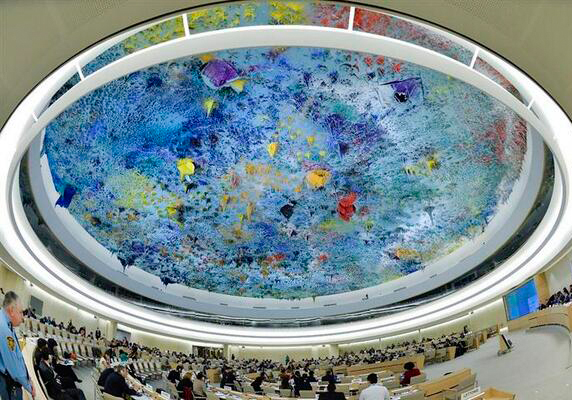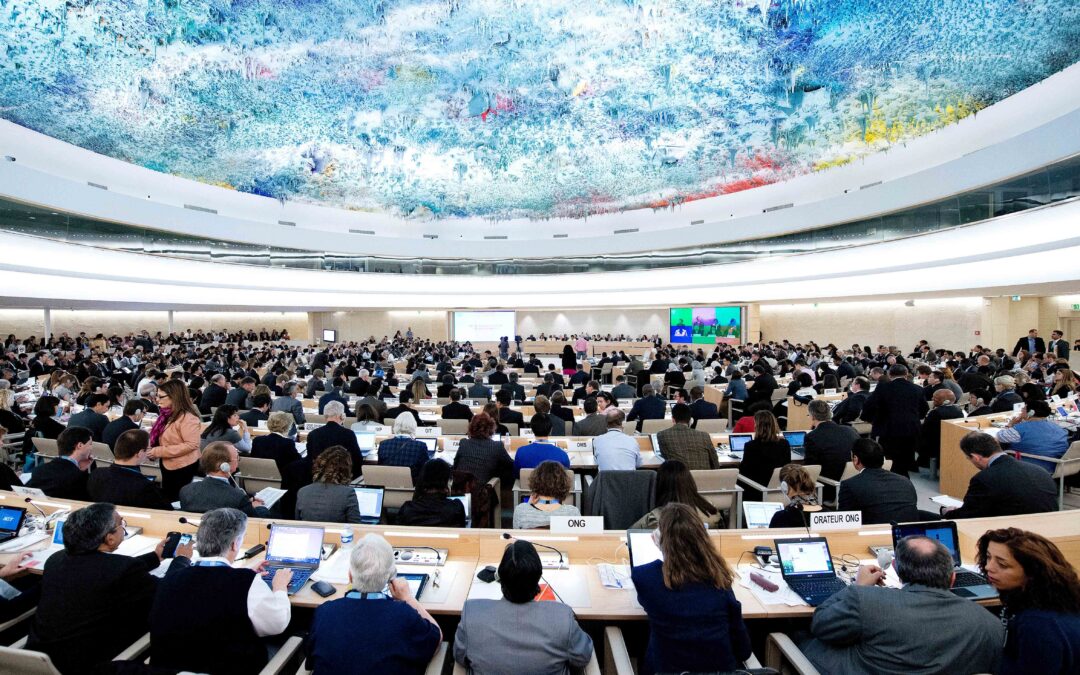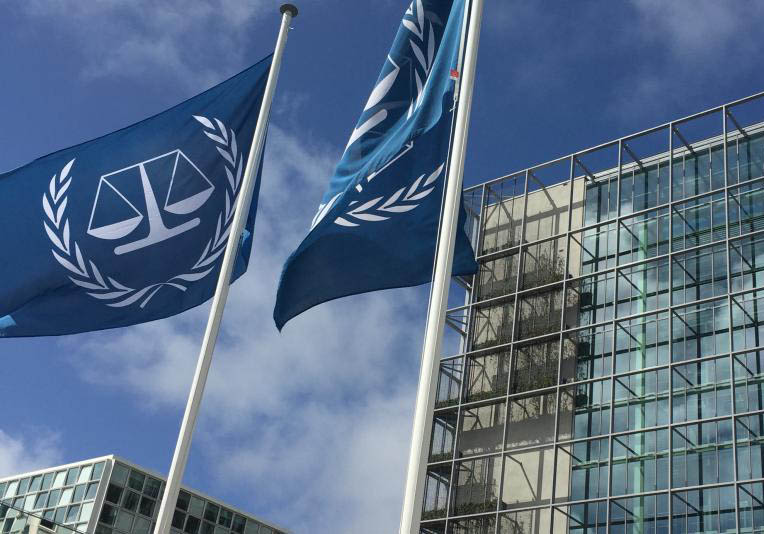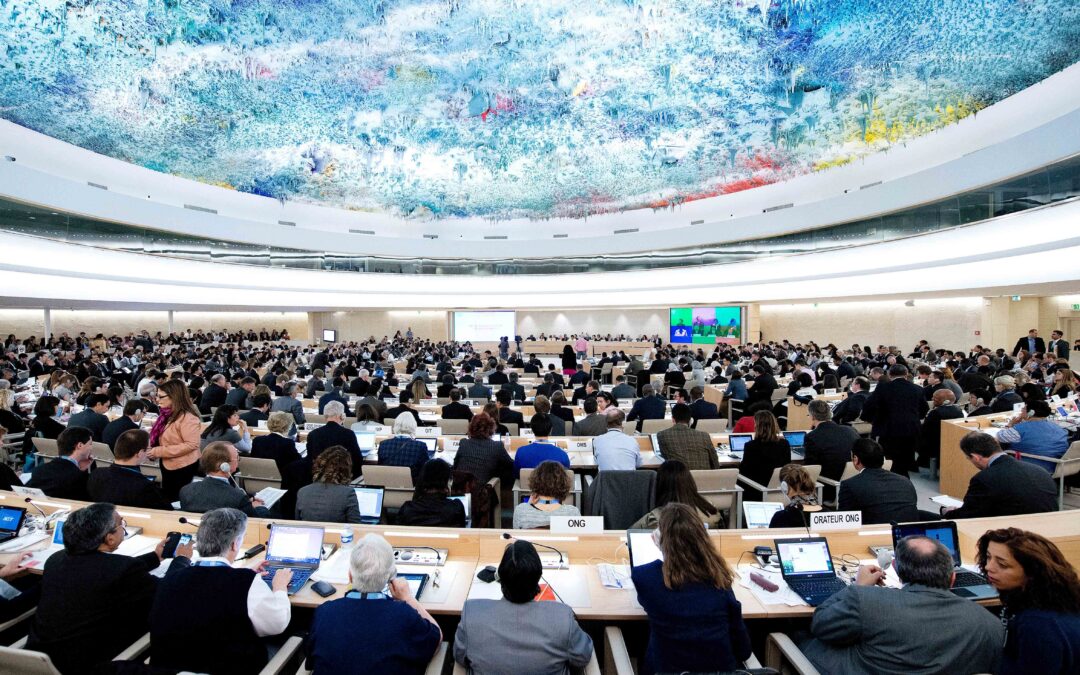
Mar 22, 2019 | Advocacy, Non-legal submissions
The ICJ has joined with ten other leading human rights organisations to highlight the key outcomes of the 40th regular session of the UN Human Rights Council in Geneva, at its conclusion on 22 March 2019.
The joint NGO statement, delivered at the end of the session, reads as follows:
“We welcome the positive step the Council has taken in the direction to effectively protect environmental human rights defenders (EHRDs) from the grave reality they face every day. By adopting the resolution by consensus, the Council has collectively and explicitly recognized the vital role of EHRDS, including in attaining the SDGs sustainable development goals and ensuring that no-one is left behind, and called for their protection. We also welcome the call on States to provide a safe and empowering context for initiatives organised by young people and children to defend human rights relating to the environment. We, however, regret that the resolution does not squarely address the obligations of international financial institutions and investors.
We welcome South Africa’s leadership to put on the Council’s agenda emerging human rights issues, in bringing attention to the multiple and intersecting forms of discrimination that women and girls face in the field of sports, especially on the basis of race and gender.
The Council has ensured its continued attention to grave rights violations across the globe.
While we welcome the extension of Council attention on Sri Lanka for another two years, a concrete, transparent, and time-bound action plan is urgently needed to implement its commitments under resolution 30/1 in collaboration with OHCHR. Given the lack of progress and political will to implement these commitments, in the absence of immediate progress, the Council should consider additional measures or mechanisms for ensuring victims’ rights to truth, justice and reparations. Individual States need not wait to exercise universal jurisdiction.
We welcome the resolution on Myanmar and its strong focus on ending impunity and ensuring accountability, and we call for the swift operationalisation of the Independent Investigative Mechanism (IIM). We welcome steps taken to review the UN’s involvement in Myanmar. We urge the UN Secretary-General to ensure that it is independent and transparent, and present the findings and recommendations at the Council’s 43rd session.
We welcome the renewal of the mandate of the Commission on Human Rights in South Sudan, a vital mechanism for human rights reporting and evidence gathering. It sends the right message to the government and all parties to the conflict: There can be no lasting peace without justice.
The Council continued this session to initiate action on country situations based on objective criteria through resolutions and joint statements.
By adopting a resolution on Nicaragua, the Council sent a signal to victims of the current crisis that the international community will not allow impunity for the serious ongoing violations to prevail. We look forward to robust reporting from the OHCHR and we urge the Nicaraguan government to fully engage with the Office to ensure the victims’ rights to truth, justice and reparation.
The Council sent a strong message of support to human rights defenders in Saudi Arabia through the joint statement by 36 States, led by Iceland, calling for the release of detained women human rights defenders and called on the Saudi government to fully cooperate with the Special Rapporteur on extrajudicial, summary or arbitrary executions in her investigation into the killing of journalist Jamal Khashoggi. We urge the Saudi authorities to respond fully to these calls, and States to follow up with a resolution at the June session to maintain attention to the situation until meaningful progress, including the release of defenders, is made.
LGBT people in Chechnya are being abducted, locked up in secret detention sites, tortured and sometimes killed purely because of their sexual orientation. We welcome the joint statement on Chechnya delivered by more than 30 States and join the call on the Russian authorities for the persecution to stop: for the immediate and unconditional release of all detained for their actual or perceived sexual orientation or gender identity, and for swift, thorough, and impartial investigations.
We welcome the Cameroon joint statement which advances both Council membership standards and its prevention mandate, and urge the Council to keep the matter under scrutiny.
While we have welcomed the Council’s attention to several situations of gross rights violations, we remain concerned about the lack of consistent and principled leadership by States, in particular by Council members.
We are disappointed that even though the demands of several EU and WEOG States to move the resolution on accountability for crimes committed in the Occupied Palestinian Territories from item 7 to item 2 was met, they still failed to support the resolution. This suggests that no matter the item number, some WEOG members continue in failing to protect the human rights of Palestinians, effectively shielding Israel from accountability.
We regret that States have yet again failed to initiate Council action on the Philippines amidst continued unlawful killings in the government’s so-called war on drugs, and increased targeting of independent media, civil society organisations, and human rights defenders. We reiterate our call on the Council to take action to mandate an independent investigation to establish the facts of human rights violations including extrajudicial executions and attacks against media and civil society, address impunity, and take steps towards justice and reparations for the victims and their families, and hope action will be taken in this regard at the next Council session.
We are deeply disappointed that the resolution adopted on Libya again lacks any meaningful accountability mechanism or mandate, despite the impunity for the widespread and systematic violations of international humanitarian and human rights law that prevail there.
We deplore that despite credible reports of the detention of up to 1 million Uyghurs and other Turkic Muslims in western China, the Council has yet again given a pass to China, permitting impunity for widespread and severe human rights violations. The efforts China has made to keep States silent, exemplified by intimidation and threats on the one hand and whitewashing the situation on the other, demonstrate the degree to which Council action could have had meaningful results if States had instead called clearly and collectively for an independent, unrestricted fact-finding mission.
On the resolution on the rights of the child, we regret the Council’s inability to emphasize the empowerment, autonomy and capacity of children with disabilities, and including to ensure that their sexual and reproductive health and rights must be respected, protected and fulfilled.
We applaud Mexico and other States’ resolve to safeguard the independence of the mandate of the Special Rapporteur on the promotion and protection of human rights while countering terrorism and to resist any attempts to dilute, distract or distort its essential focus, ensuring that the Rapporteur can continue to have positive impacts both in preventing and responding to human rights violations committed in the name of countering terrorism and in relation to the human rights of victims of terrorism. We urge States to remain vigilant to resist future attempts to undermine the Special Procedures system- the eyes and ears of the Council.
We welcome the Council’s renewal of the mandates of the Special Rapporteur on Iran and the Commission of Inquiry on Syria, so that both can continue to perform their vital work fulfilling their respective mandates and addressing the dire human rights situations in both countries. We urge the Iranian and Syrian authorities to change their posture of noncooperation with the respective mandate .
Several of our organisations have urged the UN High Commissioner to publish the database on businesses in Israeli settlements and were alarmed at its further delay. We urge the High Commissioner to release the database with all due haste.
We welcome the renewal of the Special Rapporteur on freedom of religion or belief mandate, and the maintenance of consensus on the Council resolution 16/18 framework for addressing religious intolerance . Rising intolerance and hate is a global concern, and States must move beyond rhetoric to action in implementing these standards.
The High Commissioner’s update on Venezuela during this session reflected the dire human rights situation in Venezuela. We urge all States to consider what more the Council can do to address the worsening human rights crisis in the country and to support all victims.
We note the highly disturbing report by the Special Rapporteur on adequate housing concerning grave reprisals by the Egyptian government against those who cooperated with her during her recent visit to the country and urge this Council to take action to address these attacks.
We welcome the passage of the resolution on Georgia and the continued attention devoted to the importance of full and unimpeded access for the Office of the High Commissioner and international and regional human rights mechanisms.”
Signatories:
- Amnesty International
- ARTICLE 19
- Asian Forum for Human Rights and Development (FORUM-ASIA)
- DefendDefenders (East and Horn of Africa Human Rights Defenders Project)
- Center for Reproductive Rights
- CIVICUS
- Human Rights House Foundation
- Human Rights Watch
- International Commission of Jurists
- International Federation for Human Rights (FIDH)
- International Service for Human Rights

Mar 22, 2019 | News
The ICJ today strongly welcomed the renewal of the key UN expert on counter-terrorism and human rights, on terms that maintain the mandate’s independence, integrity and its essential focus on human rights.
The renewal of the mandate of the Special Rapporteur on the promotion and protection of human rights and fundamental freedoms while countering terrorism, was enacted by a resolution adopted by consensus at the UN Human Rights Council in Geneva.
To acheive this successful outcome, Mexico (which leads the resolution) and other States had to defend the text of the resolution against attempts by Egypt and other States to insert language aimed at diluting, distorting or distracting the mandate from its current focus on preventing and responding to violations of human rights and on securing respect, protection and fulfilment of the human rights of victims of terrorism.
The Special Rapporteur delivers thematic reports to the Human Rights Council, carries out visits to countries, and acts on individual complaints. In the overall counter-terrorism architecture of the UN, the Special Rapporteur is also the only person with an exclusive independent mandate to remind States of their human rights obligations while countering terrorism, to advise them how to do so, and to draw public attention when they do not. So any dilution of the mandate would have also put the integrity and efficacy of the overall UN counter-terrorism strategy and architecture at risk.
Following the adoption of the mandate renewal resolution by the Council, the ICJ and other organisations expressed its deep appreciation for Mexico’s efforts, together with the strong support of numerous other States, to secure the future of the mandate.
The resolution text is available here: https://undocs.org/A/HRC/RES/40/16
Additional background is here.

Mar 21, 2019 | News
In a letter to Assistant Secretary-General for Human Rights, Andrew Gilmour, the ICJ, the American Civil Liberties Union (ACLU) and the International Service for Human Rights (ISHR) call on the UN to address a clear case of intimidation and threat of reprisal by U.S. Secretary of State Michael Pompeo.
In remarks to the press on 15 March 2019, Pompeo explicitly threatened to revoke or deny visas to International Criminal Court (ICC) personnel who attempt to investigate or prosecute alleged violations committed by American nationals or against citizens of U.S. allies.
The ASG is mandated to lead efforts within the UN system to end all intimidation and reprisals against those cooperating with the UN on human rights. In keeping with this mandate, the ACLU, ICJ and ISHR call on the ASG to take urgent action, including by publicly denouncing the comments, and urging U.S. representatives to refrain from adopting any legislation, policy or practice that has the effect of undermining unhindered access to and communication with the ICC and other international bodies.
The letter states that ‘The purpose of the visa restrictions is to block and deter legitimate criminal investigation into serious crimes under international law. Not only might they have a chilling effect on ICC personnel and others advocating for accountability, but they will set a dangerous precedent with serious implications on the overall fight for impunity, especially the right of victims and their legal representatives to seek justice and reparations without fear of retaliation.’
A similar communication has also been sent to three UN experts – the Special Rapporteurs on the situation of human rights defenders, on the independence of judges and lawyers, and on the promotion of truth, justice, reparation and guarantees of non-recurrence. The experts are similarly called on to publicly denounce the comments and send a formal communication to the U.S.
“The policy announced by Pompeo is part and parcel of a concerning attack by the current U.S. administration on multilateralism, international rule of law, and global and regional bodies mandated to monitor and investigate human rights violations and fight impunity,” said Sam Zarifi, Secretary General of the ICJ.
Pompeo’s announcement comes on the heels of threats made by U.S. National Security Advisor John Bolton in a 10 September 2018 speech to the Federalist Society.
In that instance, Bolton explicitly threatened ICC judges, prosecutors, and personnel if they proceed with an investigation into alleged war crimes committed by U.S. military and intelligence forces in Afghanistan, as well as any company or state that assists the ICC.
“This is an unprecedented attempt to skirt international accountability for well-documented war crimes. It reeks of the very totalitarian practices that are characteristic of the worst human rights abusers, and is a blatant effort to intimidate and retaliate against judges, prosecutors, and advocates seeking justice for victims of serious human rights abuses,” said Jamil Dakwar, Director of the ACLU’s Human Rights Program.
The letter cites Human Rights Council Resolution 36/21 and the UN Declaration on Human Rights Defenders, which reaffirm the right of everyone, individually and in association with others, to unhindered access to and communication with international bodies.
“This latest attack by the US demands the strongest response from the UN, which until now has remained silent on the US’ bullying of the ICC,” said Madeleine Sinclair, Legal Counsel and New York Director of ISHR.
“Pompeo’s threats are a blatant violation of the right to cooperate with the ICC, undermine the ICC’s effectiveness and credibility, and amount to an attack on the international system itself,” she added.
Contact:
Sam Zarifi, International Commission of Jurists, e: sam.zarifi@icj.org ; t: +41 22 979 38 00
Abdullah Hasan, American Civil Liberties Union, e: ahasan@aclu.org, t: +1-646-905-8879
Madeleine Sinclair, International Service for Human Rights, e: m.sinclair@ishr.ch, t: +1-917-544-6148

Mar 20, 2019 | Advocacy, Non-legal submissions
The ICJ today joined other NGOs in addressing the UN Human Rights Council session in Geneva, on the situation for human rights in Guatemala.
The statement, delivered by Franciscans International on behalf also of ICJ and other NGOs, read as follows (translation of Spanish original):
“We welcome the High Commissioner’s Report concerning the activities of her Office in Guatemala. We share the concerns and recommendations in the report, especially those related to the indigenous peoples, migrants and legislative initiatives that would impact in the full enjoyment of human rights.
As it was highlighted in the report, we are also concerned by the current discussions on the initiative to reform the National Reconciliation Law. This reform would give amnesty to those who committed serious crimes during the armed conflict, including those who have already been convicted. This puts at risk not only the fulfillment of the state’s obligations to end impunity, but also the security and access to justice of hundreds of victims and witnesses. Guatemala should dismiss immediately the initiative and refrain from promoting any other initiative that would promote impunity.
Additionally, the political and social tensions are intensifying towards the upcoming elections, and the inclusion of various groups, especially indigenous peoples, is at risk. Currently there is a low participation and representation of indigenous peoples in the political scene of the country. Out of 178 seats in the Congress, only 18 are occupied by Mayans (from which only two are women). The State must guarantee free participation, without intimidation or threats, of indigenous peoples running for different positions.
Lastly, the regional human rights situation of migrants is aggravating and the response by Guatemala, as evidenced in the last months, shows the lack of an effective policy to deal not only with migrants in transit, but also to create conditions to prevent forced migration of Guatemalans.
We thank the work that the Office of the High Commissioner for Human Rights has done, and we stress the importance of its activities in the country.”
The full statement may be downloaded in English and the original Spanish, in PDF format, here: HRC40-OralStatement-GDitem2-Guatemala-2019-EN-ESP

Mar 20, 2019 | News
Today, the ICJ launched a legal aid clinic project in collaboration with Great Zimbabwe University, Herbert Chitepo Law School to help facilitate the establishment of a legal aid clinic at the University’s Mucheke campus.
The clinic is located at the Mucheke Campus of University in a high-density suburb in Masvingo, thereby making the services offered by the legal aid clinic more accessible for persons from disadvantaged or marginalized groups in the community.
The project, supported by the European Union, aims to improve access to justice for communities by offering free legal assistance at the University legal aid clinic, while also providing an opportunity for students to develop critical skills that will enhance their work as legal practitioners. The activity is part of a wider initiative to develop and improve University legal aid clinics in Zimbabwe.
Arnold Tsunga, the ICJ Africa Regional Director, remarked that the launch of the legal aid clinics is a building block towards greater access to justice for the people of Zimbabwe and a positive step towards attainment of SDG 16 which speaks to the importance of peace, justice and strong institutions.
Francisca Midzi, a representative of the European Union delegation to Zimbabwe, stated in her remarks that “as the law students encounter real legal problems faced by the people, [the initiative] will teach them to have a social and professional responsibility to pursue justice in society. Herbert Chitepo Law School is injecting and inculcating a spirit of service in their students and they will carry it wherever they go to practice law and gradually this will transform Zimbabwe’s legal system to be more concerned about a court user who has limited knowledge and means to fully access justice.”
Professor R.J. Zvobgo, the Vice Chancellor of Great Zimbabwe University, commended this milestone achievement and stated that it provides an opportunity for the students to give back to the community by improving the ability of persons from affected groups to access justice.
“The free legal aid assists in eradicating the notion that a university is an ivory tower, divorced from the realities of the community in which it is located,” he said.
Contact:
Brian Penduka, e: brian.penduka(a)icj.org, t: +263772274307
Elizabeth Mangenje, e: elizabeth.mangenje(a)icj.org, t: +263774742420









